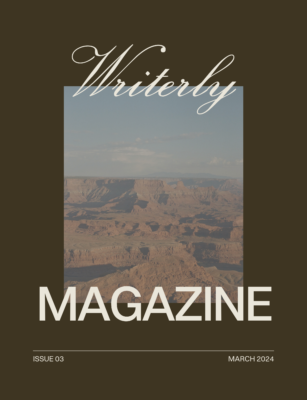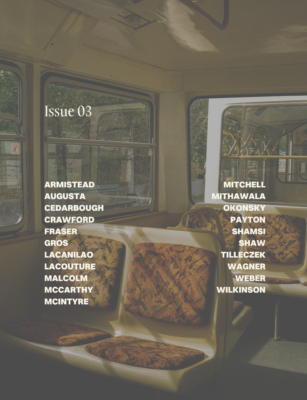New Writing In Writerly
The latest edition of Writerly contains an essay I wrote. Publishing in journals like this is part of a change in the way I approach writing and creative work.
Every writer hopes to be published. We also hope to be published somewhere that takes care of our words. And presents them beautifully.
Writerly is that kind of publication.
Writerly is a young and beautifully produced literary journal. In the latest edition, volume 3, I have an essay called The Calendar. It’s about writing, and grief, and the way our dreams sometimes come true, but never in the way we imagined they would.
I’m delighted with the way in which Writerly has presented my words, and formatted my images, and presented the work alongside other wonderful essays, stories, and poems.
Please consider buying either a digital copy of the journal or the print edition.
Writerly And My Writing Pivot
In the past year or so I’ve slowed down the pace at which I publish articles on this blog. From once a week to a couple of times a month. Partly that’s a response to personal burnout. Publishing weekly during the worst of the pandemic keep me feeling connected to the world.
But there’s more to it than that. Writing online feels less rewarding now. I reflected on this in a piece called The Slow Goodbye. Something is ending.
Creator burnout has become such a thing in 2024 that it feels like its own genre of content. My own essay in Writerly touched on it:
“I often find myself whispering, ‘I am tired of writing for the internet.’”
So I’m diverting my attention now. Part of that has gone into working on a memoir. That’s why I was on the Granta Memoir Writing Workshop (as I wrote about recently). And the other part has gone into writing and pitching essays to literary journals. Like the essay I had published in Wilde Magazine last year.
This isn’t a completely new idea. I self-published a book in 2015, partly out of concern that blogs had disappeared from the cultural radar. A few years ago I experimented with making zines for the same reason.
Life Beyond Screens
Screens have been taking over our lives for a while now. But we’ve reached an inflection point. Apple is trying to push us towards a fully virtual reality. Wrap your whole head in a screen. The rest of the tech world is trying to sell us on the inevitability of AI. Every creative act will depend on AI, apparently. The same way everything was going to be about crypto, or Web3, or NFTs, not that long ago.
At the same time, demand for physical media, vinyl, CDs and cassettes continues to rise. Physical crafts and creation is the most popular it has been in years. Audiences for cinema and antiques markets are growing after years of decline. And worldwide travel is predicted to exceed pre-pandemic levels this year.
Even though screens seem to dominate our lives, we are still a physical species.
A book or a zine or a literary journal has a heft that a blog never does. I can say I have 2,251 blogposts and people treat it like a weird quirk. Like admitting I have a vast collection of Hot Wheels cars. But if I say there’s a new essay in a literary journal, people are more likely to say, cool, where can I pick up a copy?
The Trouble With Writing For The Web
Writing for the web is weird. In a way you aren’t writing for people. You’re writing for Google (or Facebook, or whatever Twitter is called now). You are trusting that the machines will introduce your work to people. But often, they won’t.
It’s a bit like retail. You can start a fashion brand. You might hope lots of consumers will buy and wear your clothes. But your real customers are the department stores and retailers who must stock your items first. Without them you’re lost.
Google has weird rules if you want to appear in search results. You need a heading every 300 words. You need a key phrase that appears regularly but not too often. You must not do what I just did, and start consecutive sentences with the same word, even if that feels natural or part of your style.
Moreover, you have to start lots of paragraphs with connecting words like moreover.
If it occurs to you that much of what you read online is kind of the same and kind of boring, it’s because of these rules.
Everyone plays the game. Big media and news outlets increasingly play nothing but this game. It’s more than just clickbait headings. It shapes the content itself.
Of course, this will only worsen as more AI tools are used to create online writing.
The Literary Turn
With every year that passes I feel my age more acutely. The list of things I can realistically achieve with the time I have left becomes shorter. But the importance of doing those things increases.
But there’s always the possibility life will break in and disrupt the best plans we make. If the last few years haven’t taught us that, then we aren’t really paying attention.
I’ve come to realise upon reflection that I don’t want my legacy to be just digital things. This pivot in my writing is part of that. A balance of digital and analogue. Offline and online.
It’s a decision to lean into craft. Not just to produce more words, but to try to choose better ones. To say more things in different ways. And, I hope, to reach a wider and more diverse audience.
Finally, this is about how to be in the world. I’m not happy with the dividend that comes from a digital life. I don’t know anyone who is. And the people in my circle have been innovators and early adopters of digital tech for a long while. They understand the situation and feel very frustrated with it.
I want to speak to the world through the things I make. Not through the game of trying to be seen in increasingly fragmented and incoherent online spaces. Putting more of my time into the kind of work in the latest edition of Writerly seems to me the best way to do that.






